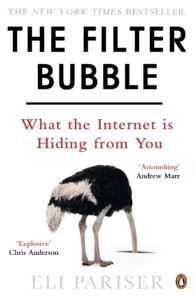The Filter Bubble: what the internet is hiding from you
 It is a tribute to the excellence of Eli Pariser’s book, The Filter Bubble, that even now, six years on from its publication, a volume about the latest technology trends still reads as up-to-date and relevant.
It is a tribute to the excellence of Eli Pariser’s book, The Filter Bubble, that even now, six years on from its publication, a volume about the latest technology trends still reads as up-to-date and relevant.
Pariser still acts as an excellent guide to what data internet companies gather about users, why they gather it and the marketing uses it gets put to – not to mention how the way information is presented to us online involves all sorts of filtering and selection decisions, many of which are obscured from us.
The book is written very much from an American perspective, for an American audience and with very little mention of the rest of the world until right near the end. That’s a shame because it is possible for internet services to rely on user data for their core business model, to make profits from this and yet to give the public much more knowledge and control than is currently the case in America. That’s not just an optimistic statement; it’s the reality from other countries. The very different approach to data in, say, Germany from the US, only gets a brief look-in near the end after many chapters which present the current American situation as being one fostered by technology rather than, more accurately, one fostered by the political decisions that Americans have taken but which others show do not have to be taken.The other factor to consider is that, as is common with people making predictions about the future in pretty much any field, Pariser falls prey at times to the myopic prediction of spotting something bad which is happening and predicting the future will be more of the same, without any countervailing reactions from anyone taking place.
So whilst Pariser is right to highlight the risks of loss of creativity, culture and functioning societies if all people are fed is information which matches what they already believe and like (though the evidence of this happening is contentious), there is no consideration in The Filter Bubble of how others might react to protect it.
Yes, creativity might be stifled if you have a monoculture of news and entertainment. But the very costs of that does and will encourage people to take counter-steps to preserve the value that Pariser is worried about being lost. The greater your fear of its loss, the greater the value you put on it – and so the greater the flaw in your picture of the future if that very picture is based on no-one taking any counter-measures.
That all said, although written in a much more lively way than a textbook, The Filter Bubble does act an excellent textbook – a good overview of the main issues and points to consider.
If you like this, you might also be interested in Writing on the wall: Social media – the first 2,000 years by Tom Standage.
Buy The Filter Bubble: what the internet is hiding from you by Eli Pariser here.
Leave a Reply